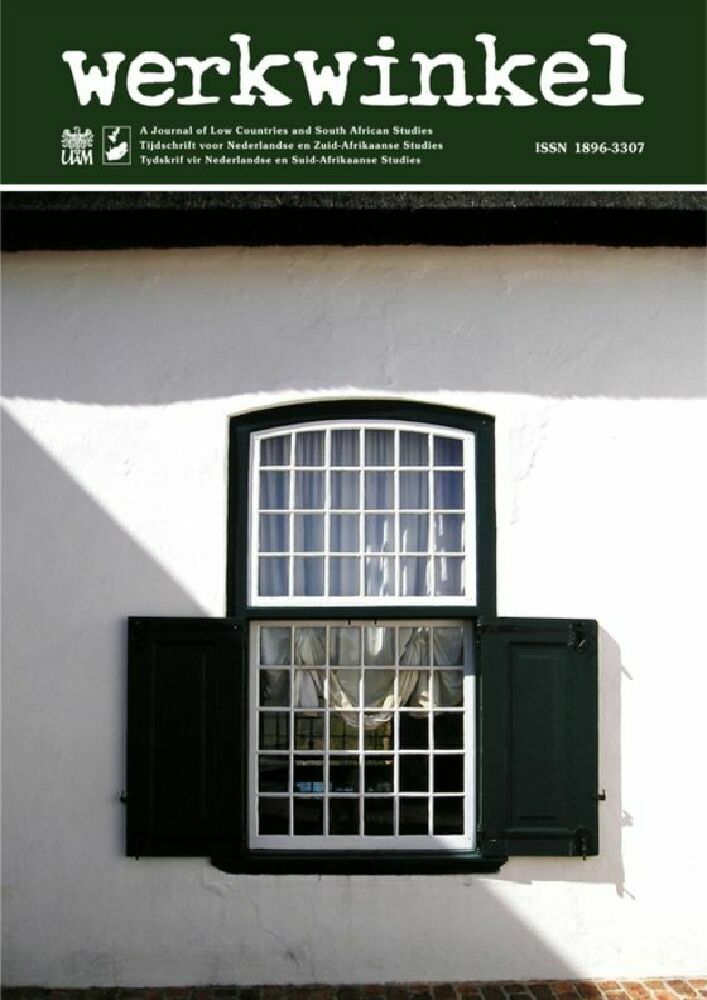Abstract
In today’s transforming European public sphere various literary authors position themselves publicly and engagingly in the debate on migration and exclusion. Dutch writer Tommy Wieringa is a clear voice in this context: his ideas on the topic are meaningfully expressed in literary novels. This article analyses Wieringa’s position as an authoritative public intellectual speaking with great moral weight about the figure of the migrant. Drawing on positioning theory, the main claim of the article will be that Wieringa’s literary articulation of migration contributes to the societal discussion and underlines a specific type of moral knowledge as well as an appeal to human solidarity.
References
Andersson, Ruben. 2014. Illegality, inc. Clandestine Migration and the Business of Bordering Europe. Oakland: University of California Press.
Baert, Patrick and Josh Booth. 2012. “Tensions Within the Public Intellectual: Political Interventions from Dreyfus to the New Social Media.” International Journal of Politics, Culture, and Society 25(4): 111-126.
Baert, Patrick and Alan Shipman. 2013. “The Rise of the Embedded Intellectual: New Forms of Public Engagement and Critique.” New Public Spheres, Recontextualizing the Intellectual. Ed. Peter Thijssen, Walter Weyns, Christiane Timmerman, and Sara Mels. Farnham: Ashgate. 27-51.
Baert, Patrick and Marcus Morgan. 2017. “A Performative Framework for the Study of Intellectuals.” European Journal of Social Theory: 1-18.Butler, Judith. 2004 Precarious Life, The Powers of Mourning and Violence. London and New York: Verso.
Chaffee, Jessie. 16 March 2016. “An Interview with Fouad Laroui.” 2 Nov. 2017. <https://www.wordswithoutborders.org/dispatches/article/interview-with-fouad--laroui>.
Collini, Stefan. 2009[2006]. Absent Minds, Intellectuals in Britain. Reprint, Oxford: Oxford University Press.
Evans Braziel, Jana. 2008. Diaspora, An Introduction. Malden: Blackwell Publishing.
Franssen, Gaston and Rick Honings, eds. 2016. Celebrity Authorship and Afterlives in English and American Literature. London: Palgrave.
Fortuin, Arjen. 5 Oct. 2012. “Op naar het beloofde land.” NRC. 10 Mei 2012 <https://www.nrc.nl/nieuws/2012/10/05/op-naar-het-beloofde-land-1158967-a362655>.
Habermas, Jürgen. 1991[1962]. The Structural Transformation of The Public Sphere. Cambridge, MA: Massachusetts Institute of Technology.
Habermas, Jürgen. 2009. Europe, The Faltering Project. Trans. Ciaran Cronin. Cambridge: Polity.
Heynders, Odile. 2016. Writers as Public Intellectuals: Literature, Celebrity, Democracy. London: Palgrave.
Hulst, Auke. 4 Nov. 2017. “Justitie, zoek uit wat Mutsaers heeft gedaan.” NRC. 12 Nov. 2017. <https://www.nrc.nl/nieuws/2017/11/04/justitie-zoek-uit-wat-mutsaers-heeft-gedaan-13829611-a1579910>.
Kapplani, Gazmend. 2010. A Short Border Handbook. Trans. Anne-Marie Stanton-Ife. London: Portobello Books.
Kapplani, Gazmend. 2017. “All You Need to Know about Border Syndrome.” Lecture at Emerson college. 2 Nov. 2017. <https://www.youtube.com/watch?v=R_l8NWnMJeU>.
Koser, Khalid. 2007. International Migration: A Very Short Introduction. Oxford: Oxford University Press.
Merolla Daniela and Sandra Ponzanesi. 2005. Migrant Cartographies, New Cultural and Literary Spaces in Post-Colonial Europe. Lanham: Rowman and Littlefi eld Publishers Inc.
McCallum, Richard. 2013. “Public Intellectuals and Micro-public Spheres: A British Illustration.” New Public Spheres, Recontextualizing the Intellectual. Eds. Peter Thijssen, Walter Weyns, Christiane Timmerman, and Sara Mels. Farnham and Burlington: Ashgate. 163-181.
McKee, Alan. 2005. The Public Sphere: An Introduction. Cambridge: Cambridge University Press.
Nail, Thomas. 2015. The Figure of the Migrant. Stanford: Stanford University Press.
Nederveen Pieterse, Jan. 2009. Globalization and Culture: Global Mélange. Lanham: Rowman and Littlefi eld Publishers Inc.
Posner, Richard A. 2004[2001]. Public Intellectuals: A Study of Decline. With a new Preface and Epilogue. 3rd printing. Cambridge, MA: Harvard University Press.
Rancière, Jacques. 2011. Mute speech, Literature, Critical Theory, and Politics. Transl. James Swenson, with an introduction by Gabriel Rockhill. New York: Columbia University Press.
Rockhill, Gabriel. 2011. “Introduction: Through the Looking-Glass – The Subversion of the Modernist Doxa.” Introduction to Jacques Rancière Mute speech, Literature, Critical Theory, and Politics. New York: Columbia University Press. 1-28.
Small, Helen, ed. 2002. The Public Intellectual. Oxford: Blackwell Publishing.
Sollund, Ragnhild Aslaug. 2012. “Introduction: Manoeuvring Rights: Immigrants’ Experiences of Inclusion and Exclusion. ”Transnational Migration, Gender and Rights (Advances in Ecopolitics, vol. 10). Eds. Liam Leonard and Ragnhild Sollund. Emerald Publishing Group Ltd: Bingley. 1-10.
Taplin, Phoebe. 21 Feb. 2015. “These are the Names by Tommy Wieringa, a Timeless Tale of Migration.” The Guardian. 2 Nov. 2017. <https://www.theguardian.com/books/2015/feb/21/these-are-the-names-by-tommy-wieringa-review-a-timeless--tale-of-migration>.
“The 1951 Refugee Convention.” n.d. 8 Nov. 2017. <http://www.unhcr.org/1951-refugee-convention.html>.
Veen, Thomas de. 2013. “Wieringa dolgelukkig met Libris.” NRC. 7 May 2013. <https://www.nrc.nl/nieuws/2013/05/07/wieringa-dolgelukkig-met-libris-a1468187>.
Vries, Joost de. 2012. “Wanhopig woestijnvolk.” De Groene Amsterdammer. 10 Oct. 2012. <https://www.groene.nl/artikel/wanhopig-woestijnvolk>.
Wieringa, Tommy. 2015. These Are the Names. Transl. Sam Garret. London: Melville House.
Wieringa, Tommy. 2017. De dood van Murat Idrissi. Amsterdam: Hollands Diep.
License
Copyright (c) 2017 Odile Heynders

This work is licensed under a Creative Commons Attribution-NonCommercial-NoDerivatives 4.0 International License.

